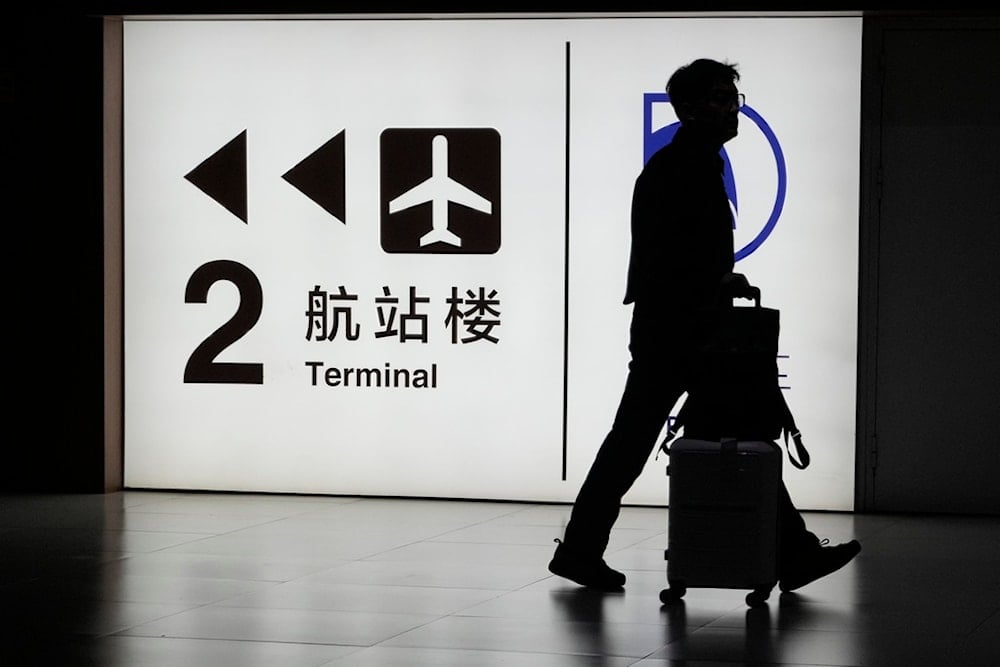China travel warning triggers nearly 500,000 Japan trip cancellations
A sharp diplomatic clash over Japan's comments on a potential Taiwan conflict has prompted Beijing to issue a travel warning, triggering nearly half a million flight cancellations and dealing a major blow to Japan's tourism-dependent economy.
-

A passenger arrives at the Capital Airport in Beijing on Nov. 7, 2025 (AP Photo/Ng Han Guan)
Nearly half a million trips from China to Japan were abruptly called off over the weekend, according to a report from the South China Morning Post, marking the most severe disruption in air travel between the two countries since the onset of the COVID-19 pandemic.
The surge in cancellations came immediately after Beijing issued a new travel advisory. On Sunday, China's Ministry of Culture and Tourism urged citizens to avoid visiting Japan and told those already there to stay alert due to unspecified safety risks.
The advisory framed the warning as a response to concerns for Chinese nationals' safety, a justification Beijing has used in past diplomatic rifts with other countries.
Chinese carriers subsequently began offering full refunds on tickets bound for Japan, a move that is highly unusual outside of major crises and was interpreted by analysts as a sign that the government wanted the advisory to have immediate impact.
Immediate Shock
The response was swift: roughly 491,000 bookings were withdrawn, representing about 32% of all travel reserved for Tokyo routes, SCMP noted. The disruption peaked over the weekend, with 82.1% of scheduled flights affected on Saturday and 75.7% on Monday.
Online travel platforms in China also reported a steep drop in searches for Japan vacations, and early data from airlines suggests that cancellations may continue into the winter holiday season if the political climate does not improve.
Tokyo lodged a formal protest against the advisory on Monday. In an attempt to ease diplomatic friction, Masaaki Kanai, director general of the Japanese Foreign Ministry's Asia and Oceania bureau, traveled to Beijing for talks.
His visit comes just weeks after Prime Minister Sanae Takaichi held face-to-face discussions with Chinese President Xi Jinping at the APEC summit, where both sides had publicly stressed the need to stabilize ties. The rapid deterioration since then has raised questions in Tokyo about whether the brief diplomatic thaw was more symbolic than substantive.
Diplomatic Fallout
The dispute intensified after Japanese Prime Minister Sanae Takaichi stated on November 7 that a Chinese strike on Taiwan would create a "survival-threatening situation," forcing Japan to respond. Beijing’s reaction to the remark has driven the current downturn in travel.
In the days following Takaichi’s comments, Beijing escalated its response beyond diplomatic protests. On November 16, China’s coast guard conducted a ‘rights enforcement patrol’ around the Senkaku islands, waters Japan controls but China claims, while Chinese military drones flew near Japan’s outer territories.
China also summoned the Japanese ambassador for the first time in more than two years, issued multiple warnings against Japanese interference in Taiwan, and urged Chinese citizens not only to avoid travel to Japan but also to reconsider studying there, citing an increasingly unstable security environment.
China views any suggestion of Japanese involvement in a Taiwan contingency as a direct challenge to its core interests, particularly given Japan’s expanding security cooperation with the United States and its recent increases in defense spending.
Tourism Strain
The timing carries significant economic implications for Japan. The Japan National Tourism Organization reported in October that more than 3.2 million foreign visitors entered the country in September 2025, with Chinese tourists forming the biggest share of arrivals.
Tourism analysts warn that a prolonged drop in Chinese visitors could hit Japan’s retail, hospitality, and regional travel sectors particularly hard, as Chinese tourists tend to account for some of the highest levels of per-capita spending.
Shares linked to tourism, department stores, and travel services fell in early trading on Monday, reflecting market concern that the downturn may extend beyond a short-term diplomatic flare-up.
Read more: China travel warning triggers market losses in Japan

 4 Min Read
4 Min Read










